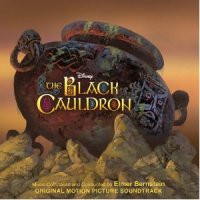- Composed by Elmer Bernstein
- Walt Disney Records / 2012 / 75:14
Disney’s animation department was in the doldrums in the mid-1980s after a string of features whose success was moderate, if it existed at all. (There had been only three films released in the decade since the mid-1970s, which seems hard to imagine for this company now.) In an attempt to revitalise themselves, they took a radical departure in The Black Cauldron, offering a considerably darker story than usual (the film got a PG rating – and had to be considerably cut even to get that), and no songs. It failed spectacularly. This led to their next attempt to revitalise themselves, with a considerably lighter story, and songs – The Little Mermaid – and that one worked (primarily because it was actually good, one suspects).
The somewhat unusual score was composed by veteran Elmer Bernstein, who had enjoyed his experience scoring his first animation, Heavy Metal, a couple of years earlier. While the 1980s are generally remembered as a relatively unhappy time for the composer, stuck in a rut of comedies he didn’t really want to work on, the first half of the decade also featured a cycle of scores for sci-fi fantasies (as well as Heavy Metal came Saturn 3 and Spacehunter). I think the results were a bit variable (some stunning music – but some questionable music too). This score sits probably in the middle of that range, not unusually for animated music shifting between styles to an occasionally jarring degree, but featuring a number of good set-pieces and some surprisingly well-developed themes.
The composer introduces his main themes through the early sections of the score – most notably the powerful theme for the villain (heard throughout the score); also a very sweet love theme (“Eilonwy”) which sounds uncannily like the wonderful song “Tell Me It’s Not True” from the musical Blood Brothers; and a comic adventure theme (“Gurgi”) which doesn’t work so well, often ending up sounding just too silly. Another comic theme (“Whirlpool”) suffers the same fate. Both of those themes are also heard in far more palatable arrangements at times, but when at their most brazenly playful are the type of thing that would make most of us turn the volume down in a hurry were anyone to enter the room while we listened to them.
Despite this great thematic range (I haven’t even mentioned some of the others), the thing most people will notice instantly when listening to the album is nothing to do with the melody, but rather more to do with the most significant featured soloist – and it will come of no surprise to anyone familiar with Bernstein’s output from the last twenty years of his career that the instrument in question is the ondes martenot. Its presence is felt throughout the score, in various different guises. When used to create a kind of ethereal effect it is very effective (combined with a small female choir in the bizarrely-titled “A Special Pig and a Vision” the effect is haunting, brilliant); but at other times the haphazard attempts to turn it into some dynamic force at the forefront of action music seems particularly misguided, resulting in a truly bizarre sound (not in a good way).
Speaking of action, there’s plenty of it here, and when it’s more orchestral it’s very effective and very impressive. At times the composer is able to stick to genuinely dark areas, focusing on the lower registers of all the sections of the orchestra and providing bold accompaniment which recalls the finer moments of those other fantasy scores I mentioned earlier. “Second Chase” is of particular note. Other individual cues worth mentioning include the wacky source music dance “Belly Good” and later another dance – this time orchestral – in “Incantation”.
There’s a rich tapestry of thematic material here, which really takes many repeated listens to fully appreciate, and it’s great that the original recording has finally been made available after all this time. The previous album, available for only a brief period after the film’s release, featured about half an hour of re-recorded highlights, which was OK, but its focus on the more lighthearted moments of the score meant that many of its best features were not included. This album ranges from the sublime to the ridiculous within its 75-minute running time, but fortunately the emphasis is more on the former than the latter, and it’s a welcome release for fans of the composer. *** 1/2













I actually prefer the Utah re-recording. It’s a better listening experience, even though the Intrada is remastered and C&C.